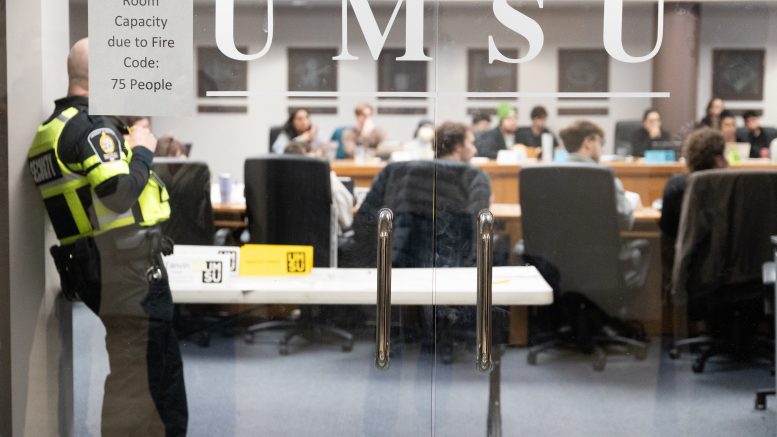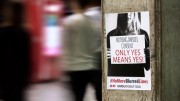Dozens lined up outside the UMSU council chambers waiting to attend the most recent UMSU board meeting on March 28 which saw deliberation on motion 0604, a proposal for UMSU to adopt the Arab Canadian Lawyer’s Association’s (ACLA) definition of anti-Palestinian racism.
The line extended around the hall, but a sign on the room’s door stated it had a capacity of 75, including UMSU board and staff, meaning only some of those waiting gained entry to the meeting itself.
The governance committee was granted the opportunity to give a presentation on the matter, but deferred it to “a student at large, and any students that wish to present,” said Charli Feener, UMSU governance committee chair. They said after presentations were completed, there would be a “consultation period.”
“I do want to reiterate, that this is not a discussion, but rather a chance for students to voice their opinions, their concerns, their perspectives,” said Feener.
A vote on the motion was not scheduled for the meeting and did not take place.
Emily Kalo, a student representing the Jewish community, said the community had been given little notice to prepare for presentations and argued that discussion of the motion should not have taken place that night.
“Rather, it should be had over the weeks to come, through true consultation, where both communities have the opportunity to compare and contrast with one another, before coming to the board of directors,” said Kalo.
Vaibhav Varma, UMSU vice president finance and operations, challenged the emergency status of the motion. Varma said the motion did not “satisfy [the] requirements” of being an emergency, as the board had voted already to discuss it in future meetings.
Varma said governance should have allowed “appropriate time to engage in consultative process with all relevant stakeholders and parties, rather than thrusting this on the board of directors at the very last minute.”
Varma said the motion was not supposed to be brought forward to the board, and was not included in the board members’ packages.
Board of directors’ chairperson Elbethel Masresha said the reason she granted the motion emergency status was to give “an opportunity to allow people to be a part of the consultation process, and to allow that to be an inclusive experience.”
After a 17-3 vote to continue the meeting and presentations, Varma said he believed that Masresha “has a conflict of interest, and clear personal position,” and as such, was “not fit to chair this delegation” on the basis of social media posts he said indicated bias.
Masresha left the meeting, saying, “my capacity to chair has been consistently undermined.”
After Masresha left, Tracy Karuhogo, UMSU president, assumed the position of interim chair to continue the meeting. When the meeting resumed following a recess, Varma announced his resignation from his position as vice president finance and operations, a position which was set to end soon after the end of the winter semester. He did not say whether the conflict of the meeting was a factor in his decision.
Following this, a vote was held on whether to adjourn the meeting due to the conflict, which did not pass.
The meeting continued after Brendan Scott, director of Bannatyne operations, was voted as interim chair for the remainder of the meeting.
The meeting allowed members of each community an equal amount of time to present.
Roleen Alarab, the student who brought the motion forward, said there was miscommunication about the board meeting’s capacity.
“There was definitely overcrowding, or even difficulty hearing, because apparently it was an open session, but the doors were closed,” she said.
“So, the people outside, that were waiting for the entire duration of the meeting didn’t know what was happening inside.”
Alarab said that the presentations during the meeting were a “catalyst for solidarity and understanding.”
“They invited others to see through our eyes, feel our heartbeats and share our dreams of justice and equality,” she said.





